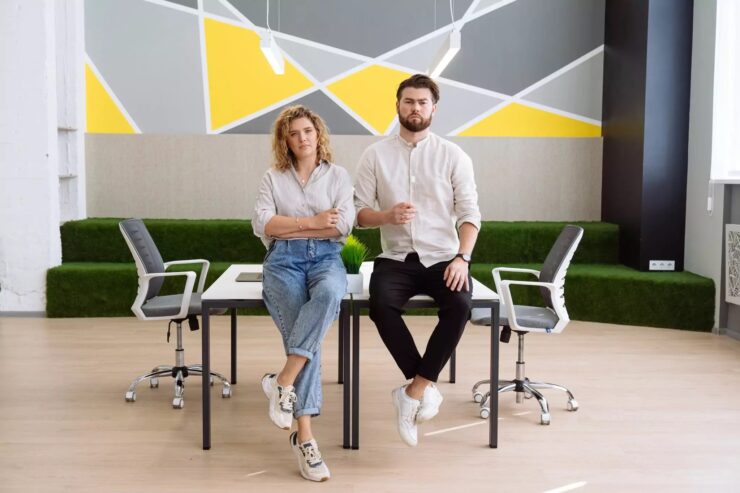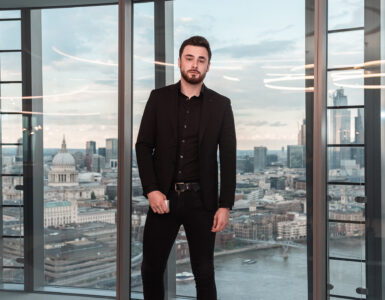When Dasha and Ilya Kichuk both swiped right on Tinder, it’s unlikely either suspected their match would lead not only to marriage, but to one of the most promising sustainability startups to come out of Eastern Europe in years.
“We both shared a deep-rooted passion for sustainability,” Dasha Kichuk, CEO and co-founder of effa, says with a smile, recalling her first meeting of Ilya. “And so, effa was conceived, initially as an idea, during our very first date.”
In a crowded sea of social enterprises and sustainability startups, effa’s story stands out in terms of its ambitious products and the number of obstacles this Ukrainian upstart had to navigate through before securing 500 Global’s investment last year.
Despite a global pandemic, a war in Ukraine and the early stage of their product, effa’s early traction impressed enough investors to raise pre-seed funding and develop two products: a sustainable toothbrush and razor. Their sales are growing 30% month to month, and the customer churn rate is 7%.
In addition to $150,000 investment from 500, earlier this year effa completed 500’s Global Flagship Accelerator Program in San Francisco, where the founding team of three is now based.
“Dasha (Kichuk)’s tenacity, grit and sharpness as a founder stood out, and her experience and track record in the industry spoke for itself,” Jacqueline Young, an investor at 500 Global, told Icebreaker. “While effa was very early-stage when we made our investment, I was intrigued by their early traction with exciting enterprise customers in massive industries, spanning hospitality, travel, and more. Their early contracts and revenue also signaled that they had developed a strong product with high demand.”
The startup has secured contracts with large companies like Netflix and Radisson, but in many ways effa’s journey is just getting started. The team is now raising their seed round in the U.S. and is working to grow R&D, its product lineup and its team beyond three co-founders.
“Considering the current situation, the whole recession, SVB (Silicon Valley Bank) crisis, all of that happened to startups, we are planning to fundraise by mid-summer, I’m really hopeful,” says Kichuk. “We’re looking for both corporate VCs and institutional VCs, but it’s a much longer process than it was before.”
Ukrainian Beginnings
Before relocating to the United States last year, Ilya and Dasha began testing and developing their idea in Ukraine. They launched it the company in 2018.
When COVID-19 pandemic hit, it looked like effa’s dreams might be swept away. Many inventors got cold feet. The team was on the brink of collapse.
This would be the moment many would rethink their strategy or shut everything down, but effa’s founders got to work. After months of developing and iterating on their design, effa launched their first product, a sustainable toothbrush, in early 2021.
But just as the company was ramping up, Russia invaded Ukraine in February of 2021. Investments fell through, contracts were canceled, and effa had to lay off over half their team.
Once again, the founders doubled down on their vision. They’ve honed in on the B2B enterprise model. Since then, the company has counted Delta Airlines, Marriott Hotels, and Netflix among their clients.
“We’re working with hotels, airlines, district distributors, we’re working with smaller businesses like dental clinics,” Kichuk notes.
While they raised $500,000 in 2021 while still based in Ukraine, they didn’t receive the full amount when the war broke out and investors got cold feet. They raised $310,000 in total to date.
After raising $150,000 from 500, they’re now looking to raise $1.5 million to expand their R&D operations and move their manufacturing from China to South America in an effort to reduce carbon footprint.
Sustainability Promise
Setting and maintaining sustainability standards is challenging for a company of any size. effa’s founders seem to be well aware of the obstacles.
“In terms of manufacturing, we have a lot of limitations as a tiny startup that doesn’t have millions of dollars to operate and improve our manufacturing process,” Kichuk notes. “But we have managed to develop the technology using dry molding technology, so we are not using water in our manufacturing process, which is usually a huge concern of paper manufacturing–-they waste a lot of water.”
Optimization of the supply chain is another headache. Currently their manufacturing operations are based in China.
“China is the easiest place to start your manufacturing to do the testing batches, but when you start delivering worldwide–there is a huge issue of your supply chain and CO2 footprint when you’re delivering your product.”
The company’s investors recognize their progress as well as remaining challenges. 500’s Young is optimistic about their positioning despite growing competition in their market segment.
“Sustainability continues to be an important topic at the forefront of enterprises’ and consumers’ minds alike, meaning effa is innovating in an increasingly competitive industry,” she told Icebreaker. “That being said, effa’s product lines are differentiated in the market for a number of reasons–spanning UX, design, and technology to name a few–and Dasha and her team are uniquely positioned to penetrate the industry.”
While California banned single-use plastics in hotels in January and Washington State plans to follow in 2027, the rest of the country has yet to catch up with this program. Other countries are arguably moving faster than the U.S.
“We need to get to this market as fast as possible and in order to get there, we need to issue more products than just a toothbrush and the razor,” Kichuk says. “So that’s why the team and R&D are the main reasons why we are fundraising right now.”
Next Steps
So what’s next for these Ukrainian eco-warriors?
They are looking to close their seed round this summer, expand into direct-to-consumer market, and make Silicon Valley their home.
In addition to funding and mentorship from a US VC firm, the American business culture is what attracted effa’s team and is likely to keep them based here.
“What I love about the United States is the business culture where the decisions are made fast, you will get yes or no within a month even working with big distributors or big enterprise,” she notes. “In Europe it is much slower, it will take you six months, 12 months to get any reply and investors tend to be much slower in Europe than in the United States–that’s why we are here.”






Add comment